Alek Tarkowski
Author of the research chapter on Poland
 Alek Tarkowski is a sociologist, digital rights activist, and strategist. He is co-founder and president of Centrum Cyfrowe Foundation, a think-and-do tank. His work focuses on strategies and public policies through which digital technologies serve openness, collaboration, and engagement. Recently, he has also focused on the social and cultural dimensions of the latest phase of technological change. Alek is a board member of Creative Commons, founder of Creative Commons Poland, and co-founder of Communia, a European advocacy association supporting the digital public domain. He is an alumnus of New Europe Challenger 2016 and Leadership Academy of Poland (class of 2017), a member of the Steering Committee of the Internet Governance Forum Poland, a former member of the Polish Board of Digitization (an advisory body to the Minister of Digitization), and a member of the Board of Strategic Advisors to the Prime Minister of Poland.
Alek Tarkowski is a sociologist, digital rights activist, and strategist. He is co-founder and president of Centrum Cyfrowe Foundation, a think-and-do tank. His work focuses on strategies and public policies through which digital technologies serve openness, collaboration, and engagement. Recently, he has also focused on the social and cultural dimensions of the latest phase of technological change. Alek is a board member of Creative Commons, founder of Creative Commons Poland, and co-founder of Communia, a European advocacy association supporting the digital public domain. He is an alumnus of New Europe Challenger 2016 and Leadership Academy of Poland (class of 2017), a member of the Steering Committee of the Internet Governance Forum Poland, a former member of the Polish Board of Digitization (an advisory body to the Minister of Digitization), and a member of the Board of Strategic Advisors to the Prime Minister of Poland.Aleksi Knuutila
Author of the jornalistic story on Sweden
 Aleksi Knuutila is an anthropologist and a data scientist who studies new forms of political culture, communities, and communication. He is interested in the application of interdisciplinary methods that combine interpretative, qualitative methods to the computational study of largescale digital data. Knuutila works as a postdoctoral researcher in the Computational Propaganda Project.
Aleksi Knuutila is an anthropologist and a data scientist who studies new forms of political culture, communities, and communication. He is interested in the application of interdisciplinary methods that combine interpretative, qualitative methods to the computational study of largescale digital data. Knuutila works as a postdoctoral researcher in the Computational Propaganda Project.Alessio Ravazzani
Comic artist
 Alessio Ravazzani is an editorial graphic designer, cartoonist, and illustrator who collaborates with the most prestigious comics and graphic novel publishers in Italy. He is an author with the Mammaiuto collective, of which he has been a member since its foundation.
Alessio Ravazzani is an editorial graphic designer, cartoonist, and illustrator who collaborates with the most prestigious comics and graphic novel publishers in Italy. He is an author with the Mammaiuto collective, of which he has been a member since its foundation.Anne Kaun
Author of the research chapter on the Sweden

Anne Kaun is an associate professor in media and communication studies at Södertörn University, Stockholm, Swe- den. Her research interests include media activism, media practices, critical studies of algorithms, automation, and artificial intelligence. Together with Fredrik Stiernstedt, she is currently pursuing a larger project on the media history and media future of prisons. In addition, she is studying automated decision-making in the public sector and its implications for the welfare state as well as democratic values. As part of this work, she facilitates the Swedish Network on Automated Decision-Making in the Public Sector that gathers scholars from diverse disciplines studying algorithmic automation in Sweden.
Beate Autering
Graphic designer and layout artist
 Beate Autering is a freelance graphic designer. She graduated in design and runs the beworx studio with Tiger Stangl. Together they create designs, graphics, and illustrations and also provide image editing and post-production services. Their clients include iRights, mdsCreative, Agentur Sehstern, UNESCO World Heritage, and various city libraries.
Beate Autering is a freelance graphic designer. She graduated in design and runs the beworx studio with Tiger Stangl. Together they create designs, graphics, and illustrations and also provide image editing and post-production services. Their clients include iRights, mdsCreative, Agentur Sehstern, UNESCO World Heritage, and various city libraries.Beate Stangl
Additional Graphic designer and layout artist
 Beate Stangl is a qualified designer and she works in Berlin on design projects for Friedrich Ebert Stiftung, Buske Verlag, UNESCO Welterbe Deutschland e.V., Sehstern Agency, iRights Lab, Landesspracheninstitut Bochum, and beworx.
Beate Stangl is a qualified designer and she works in Berlin on design projects for Friedrich Ebert Stiftung, Buske Verlag, UNESCO Welterbe Deutschland e.V., Sehstern Agency, iRights Lab, Landesspracheninstitut Bochum, and beworx.Brigitte Alfter
Author of the research chapter on Denmark
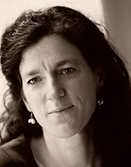 Brigitte Alfter is a senior German-Danish journalist, director for Arena for Journalism in Europe, and lecturer at the University of Gothenburg. Having practiced journalism at local, national, and European levels, she realized there was a need for cross-border collaborative journalism structures. Since 2008, she has practiced, and assisted colleagues in practicing, in-depth journalism in Europe on European issues. She develops European support and infrastructures for cross-border journalism, combines journalism practice, entrepreneurial activities, teaching/training with academic research.
Brigitte Alfter is a senior German-Danish journalist, director for Arena for Journalism in Europe, and lecturer at the University of Gothenburg. Having practiced journalism at local, national, and European levels, she realized there was a need for cross-border collaborative journalism structures. Since 2008, she has practiced, and assisted colleagues in practicing, in-depth journalism in Europe on European issues. She develops European support and infrastructures for cross-border journalism, combines journalism practice, entrepreneurial activities, teaching/training with academic research.Catherine Egli
Author of the research chapter on the Switzerland
 Catherine Egli recently graduated with a double bilingual master’s in law degree from the Universities of Basel and Geneva. Her thesis focused on automated individual decision-making and the need for regulation in the Swiss Administrative Procedure Act. Alongside her studies, she worked for the chair of Prof. Dr. Nadja Braun Binder by conducting research on legal issues related to automated decision-making. Her favorite topics of research include the division of powers, digitization of public administration, and digital democracy.
Catherine Egli recently graduated with a double bilingual master’s in law degree from the Universities of Basel and Geneva. Her thesis focused on automated individual decision-making and the need for regulation in the Swiss Administrative Procedure Act. Alongside her studies, she worked for the chair of Prof. Dr. Nadja Braun Binder by conducting research on legal issues related to automated decision-making. Her favorite topics of research include the division of powers, digitization of public administration, and digital democracy.Eduardo Santos
Author of the research chapter on Portugal
 Eduardo Santos is a Lisbon-based lawyer. He graduated from the faculty of law at the University of Lisbon, and he is a co-founder, and the current president, of D3 - Defesa dos Direitos Digitais, the Portuguese Digital Rights Association, part of the European Digital Rights (EDRi) association. Eduardo’s work at D3 focuses on tech policy, advocacy, and lobbying related to digital rights issues including, privacy, net neutrality, data retention, video surveillance, copyright, and regulation of platforms both at a local and a European level. He has also contributed to research projects within the areas of law and technology and has been an active civil society representative on international Internet governance fora such as IGF and EuroDIG.
Eduardo Santos is a Lisbon-based lawyer. He graduated from the faculty of law at the University of Lisbon, and he is a co-founder, and the current president, of D3 - Defesa dos Direitos Digitais, the Portuguese Digital Rights Association, part of the European Digital Rights (EDRi) association. Eduardo’s work at D3 focuses on tech policy, advocacy, and lobbying related to digital rights issues including, privacy, net neutrality, data retention, video surveillance, copyright, and regulation of platforms both at a local and a European level. He has also contributed to research projects within the areas of law and technology and has been an active civil society representative on international Internet governance fora such as IGF and EuroDIG.Eleftherios Chelioudakis
Author of the research chapter on Greece
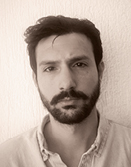 Eleftherios Chelioudakis is co-founder of Homo Digitalis, the Greek civil society organization which is a member of the European
Digital Rights (EDRi) network. He is a lawyer admitted to practice in Greece, while he also works as a research associate at the Centre for IT & IP Law (CiTiP) at Katholieke Universiteit (KU) Leuven. Eleftherios holds an LLB from National and Kapodistrian University of Athens, an LL.M. in law and technology from Tilburg University Law School, and a master’s in digital humanities from the Computer
Science School of KU Leuven. Finally, he holds a Fellow of Information Privacy (FIP) designation, as well as CIPP/E and CIPM certifications from the International Association of Privacy Professionals (IAPP).
Eleftherios Chelioudakis is co-founder of Homo Digitalis, the Greek civil society organization which is a member of the European
Digital Rights (EDRi) network. He is a lawyer admitted to practice in Greece, while he also works as a research associate at the Centre for IT & IP Law (CiTiP) at Katholieke Universiteit (KU) Leuven. Eleftherios holds an LLB from National and Kapodistrian University of Athens, an LL.M. in law and technology from Tilburg University Law School, and a master’s in digital humanities from the Computer
Science School of KU Leuven. Finally, he holds a Fellow of Information Privacy (FIP) designation, as well as CIPP/E and CIPM certifications from the International Association of Privacy Professionals (IAPP).Fabio Chiusi
Editor, author of the journalistic story and research chapter on the Italy as well as of the introduction and the EU chapter
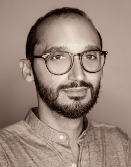 Fabio Chiusi works at AlgorithmWatch as the co-editor and project manager for the 2020 edition of the Automating Society report. After a decade in tech reporting, he started as a consultant and assistant researcher in data and politics (Tactical Tech) and AI in journalism (Polis LSE). He coordinated the “Persuasori Social” report about the regulation of political campaigns on social media for the PuntoZero Project, and he worked as a tech-policy staffer within the Chamber of Deputies of the Italian Parliament during the current legislation. Fabio is a fellow at the Nexa Center for Internet & Society in Turin and an adjunct professor at the University of San Marino, where he teaches journalism and new media and publishing and digital media. He is the author of several essays on technology and society, the latest being “Io non sono qui. Visioni e inquietudini da un futuro presente” (DeA Planeta, 2018), which is currently being translated into Polish and Chinese. He also writes as a tech-policy reporter for the collective blog ValigiaBlu.
Fabio Chiusi works at AlgorithmWatch as the co-editor and project manager for the 2020 edition of the Automating Society report. After a decade in tech reporting, he started as a consultant and assistant researcher in data and politics (Tactical Tech) and AI in journalism (Polis LSE). He coordinated the “Persuasori Social” report about the regulation of political campaigns on social media for the PuntoZero Project, and he worked as a tech-policy staffer within the Chamber of Deputies of the Italian Parliament during the current legislation. Fabio is a fellow at the Nexa Center for Internet & Society in Turin and an adjunct professor at the University of San Marino, where he teaches journalism and new media and publishing and digital media. He is the author of several essays on technology and society, the latest being “Io non sono qui. Visioni e inquietudini da un futuro presente” (DeA Planeta, 2018), which is currently being translated into Polish and Chinese. He also writes as a tech-policy reporter for the collective blog ValigiaBlu.Friederike Reinhold
Additional editing of the introduction and policy recommendations
 As a senior policy advisor, Friederike Reinhold is responsible for advancing AlgorithmWatch’s policy and advocacy efforts. Prior to joining AlgorithmWatch, she worked as a Humanitarian Policy Advisor at the German Federal Foreign Office, with the Norwegian Refugee Council (NRC) in Iran, with Deutsche Gesellschaft für Internationale Zusammenarbeit (GIZ) in Afghanistan, and at the WZB Berlin Social Science Center.
As a senior policy advisor, Friederike Reinhold is responsible for advancing AlgorithmWatch’s policy and advocacy efforts. Prior to joining AlgorithmWatch, she worked as a Humanitarian Policy Advisor at the German Federal Foreign Office, with the Norwegian Refugee Council (NRC) in Iran, with Deutsche Gesellschaft für Internationale Zusammenarbeit (GIZ) in Afghanistan, and at the WZB Berlin Social Science Center.Gabriela Taranu
Author of the research chapter on Sweden
 Gabriela Taranu is a Romanian marketing specialist based in Sweden interested in social media and digital communication. She studied communication and public relations at the University of Bucharest before completing a master’s degree in media, communication, and cultural analysis at Södertörn University. Her studies focussed on the Korean music industry and its influence upon different demographics to analyze trends in popular culture and how they connect with consumers through social media and marketing campaigns. After finishing her studies, Gabriela worked in digital marketing and social media at a tech start-up to improve communication channels and create strong relations between the product and its users.
Gabriela Taranu is a Romanian marketing specialist based in Sweden interested in social media and digital communication. She studied communication and public relations at the University of Bucharest before completing a master’s degree in media, communication, and cultural analysis at Södertörn University. Her studies focussed on the Korean music industry and its influence upon different demographics to analyze trends in popular culture and how they connect with consumers through social media and marketing campaigns. After finishing her studies, Gabriela worked in digital marketing and social media at a tech start-up to improve communication channels and create strong relations between the product and its users.Gerda Kelly Pill
Author of the jornalistic story chapter on Estonia
 Gerda Kelly Pill is currently working in the ICT sector as a marketing and communications manager. Her job includes working with making complex topics understandable, communicating to an international audience, and bringing digitization to the construction, real estate, and facility management industries. Gerda is most passionate about information and media literacy, privacy, freedom of speech, and gender equality. She is currently in her second year of master’s studies in communications at the University of Tartu. Gerda intends to write her thesis on media literacy and media education in Estonia.
Gerda Kelly Pill is currently working in the ICT sector as a marketing and communications manager. Her job includes working with making complex topics understandable, communicating to an international audience, and bringing digitization to the construction, real estate, and facility management industries. Gerda is most passionate about information and media literacy, privacy, freedom of speech, and gender equality. She is currently in her second year of master’s studies in communications at the University of Tartu. Gerda intends to write her thesis on media literacy and media education in Estonia.Graham Holliday
Copy editing
 Graham Holliday is a freelance editor, author, and journalism trainer. He has worked in a number of roles for the BBC for almost two decades, and he was a correspondent for Reuters in Rwanda. He works as an editor for CNN’s Parts Unknown and Roads & Kingdoms – the international journal of foreign correspondence. The late Anthony Bourdain published Graham’s first two books, which were reviewed in the New York Times, Los Angeles Times, Wall Street Journal, Publisher’s Weekly, Library Journal, and on NPR, among other outlets.
Graham Holliday is a freelance editor, author, and journalism trainer. He has worked in a number of roles for the BBC for almost two decades, and he was a correspondent for Reuters in Rwanda. He works as an editor for CNN’s Parts Unknown and Roads & Kingdoms – the international journal of foreign correspondence. The late Anthony Bourdain published Graham’s first two books, which were reviewed in the New York Times, Los Angeles Times, Wall Street Journal, Publisher’s Weekly, Library Journal, and on NPR, among other outlets.Hauke Hille
CMS Developer
 Hauke Hille is a freelance full stack web developer. Having started his career in 1998, he is exceptionally experienced in most common web technologies and able to conceptualize content management processes on the fly. While he has developed a wide range of web applications over the years, he now specializes in fast and lean Wordpress systems; building themes and plugins from scratch. In parallel to his accomplishments in web development, Hauke also has a second career as a professional photographer since 2009.
Hauke Hille is a freelance full stack web developer. Having started his career in 1998, he is exceptionally experienced in most common web technologies and able to conceptualize content management processes on the fly. While he has developed a wide range of web applications over the years, he now specializes in fast and lean Wordpress systems; building themes and plugins from scratch. In parallel to his accomplishments in web development, Hauke also has a second career as a professional photographer since 2009.Jose Miguel Calatayud
Author of the research chapter on Spain
 Jose Miguel Calatayud is a Spanish freelance journalist. Based in Barcelona between 2016 and 2019, Jose relocated to Berlin in 2020. Currently, he covers Europe and focuses on long-term investigations, and he is especially interested in democracy and human rights. Since 2019, he has also worked with Arena for Journalism in Europe, a non-profit foundation that promotes cross-border collaborative journalism. In 2017, he was awarded an Open
Society fellowship to carry out journalistic research into the political engagement of citizens across Europe. Between 2012 and 2014, he was based in Istanbul and covered Turkey and the region for the Spanish daily newspaper, El País. Earlier, from 2009, he was based in East Africa, where he was a correspondent for the Spanish news agency, Efe, and, from 2011, for El País. His work has also appeared in Foreign Policy, Al Jazeera, New Statesman, The Independent, Agence France-Presse, Radio France Internationale, and Deutsche
Welle, among others.
Jose Miguel Calatayud is a Spanish freelance journalist. Based in Barcelona between 2016 and 2019, Jose relocated to Berlin in 2020. Currently, he covers Europe and focuses on long-term investigations, and he is especially interested in democracy and human rights. Since 2019, he has also worked with Arena for Journalism in Europe, a non-profit foundation that promotes cross-border collaborative journalism. In 2017, he was awarded an Open
Society fellowship to carry out journalistic research into the political engagement of citizens across Europe. Between 2012 and 2014, he was based in Istanbul and covered Turkey and the region for the Spanish daily newspaper, El País. Earlier, from 2009, he was based in East Africa, where he was a correspondent for the Spanish news agency, Efe, and, from 2011, for El País. His work has also appeared in Foreign Policy, Al Jazeera, New Statesman, The Independent, Agence France-Presse, Radio France Internationale, and Deutsche
Welle, among others.Katarina Lind
Author of the jornalistic story chapter on Sweden
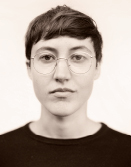 Katarina Lind is a Swedish data journalist who worked with J++, an international team of data journalists, on the chapter about automating the welfare system in Sweden.
Katarina Lind is a Swedish data journalist who worked with J++, an international team of data journalists, on the chapter about automating the welfare system in Sweden.Koen Vervloesem
Author of the jornalistic stories chapter on the netherlands and Belgium
 Koen Vervloesem is a Belgian freelance journalist. He holds master’s degrees in engineering (computer science) and in philosophy. He has been writing about artificial intelligence, programming, privacy, computer security, Linux, open-source, and the Internet of Things for more than 20 years.
Koen Vervloesem is a Belgian freelance journalist. He holds master’s degrees in engineering (computer science) and in philosophy. He has been writing about artificial intelligence, programming, privacy, computer security, Linux, open-source, and the Internet of Things for more than 20 years.Konrad Szczygieł
Author of the jornalistic story chapter on Poland
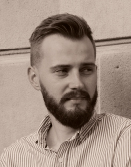 Konrad Szczygieł is a Polish journalist working with Reporters Foundation (Fundacja Reporterów) and VSquare.org. He is a former investigative reporter at OKO. press and Superwizjer TVN. In 2016, and 2018, he was shortlisted for the Grand Press award. Konrad is based in Warsaw.
Konrad Szczygieł is a Polish journalist working with Reporters Foundation (Fundacja Reporterów) and VSquare.org. He is a former investigative reporter at OKO. press and Superwizjer TVN. In 2016, and 2018, he was shortlisted for the Grand Press award. Konrad is based in Warsaw.Kristina Penner
Author on the EU chapter
 Kristina Penner is the executive advisor at AlgorithmWatch. Her research interests include ADM in social welfare systems, social scoring, and the societal impacts of ADM, as well as the sustainability of new technologies from a holistic lens. Her analysis of the EU border management system builds on her previous experience in research and counseling on asylum law. Further experience includes projects on the use of media in civil society and conflict-sensitive journalism, as well as stakeholder involvement in peace processes in the Philippines. She holds a master’s degree in international studies/peace and conflict research from Goe- the University in Frankfurt.
Kristina Penner is the executive advisor at AlgorithmWatch. Her research interests include ADM in social welfare systems, social scoring, and the societal impacts of ADM, as well as the sustainability of new technologies from a holistic lens. Her analysis of the EU border management system builds on her previous experience in research and counseling on asylum law. Further experience includes projects on the use of media in civil society and conflict-sensitive journalism, as well as stakeholder involvement in peace processes in the Philippines. She holds a master’s degree in international studies/peace and conflict research from Goe- the University in Frankfurt.Lenart J. Kučić
Author of the jornalistic story chapter on Slovenia
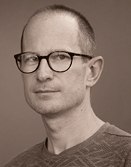 Lenart J. Kučić is a journalist, lecturer, and podcaster. He is a member of Pod črto, a non-profit and independent media collective specialized in investigative reporting, data journalism, and in-depth stories. He is a co-editor of the online magazine Disenz and a co-founder of the podcasting network, Marsowci. In addition, he is the author and co-author of several books, expert articles, and studies on the subjects of media ownership and new media. His recent work focuses on computational propaganda, the use of algorithms, and the social impact of ICT’s.
Lenart J. Kučić is a journalist, lecturer, and podcaster. He is a member of Pod črto, a non-profit and independent media collective specialized in investigative reporting, data journalism, and in-depth stories. He is a co-editor of the online magazine Disenz and a co-founder of the podcasting network, Marsowci. In addition, he is the author and co-author of several books, expert articles, and studies on the subjects of media ownership and new media. His recent work focuses on computational propaganda, the use of algorithms, and the social impact of ICT’s.Leo Wallentin
Author of the jornalistic story chapter on Sweden
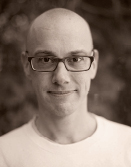 Leo Wallentin is a Swedish data journalist and CEO at J++ Stockholm, a consultancy agency doing data-driven research, storytelling, and training for newsrooms. Leo has spent the last decade specializing in data-driven and data-critical journalism.
Leo Wallentin is a Swedish data journalist and CEO at J++ Stockholm, a consultancy agency doing data-driven research, storytelling, and training for newsrooms. Leo has spent the last decade specializing in data-driven and data-critical journalism.Leonard Haas
Additonal editing
 Leonard Haas works as a research assistant at AlgorithmWatch. Among other things, he was responsible for the conception, implementation, and maintenance of the AI Ethics Guidelines Global Inventory. He is a master’s student in the field of social sciences at the Humboldt University Berlin and holds two Bachelor’s degrees from the University of Leipzig in Digital Humanities and Political Science. His research focuses on the automation of work and governance. In addition, he is interested in public interest data policy and labor struggles in the tech industry.
Leonard Haas works as a research assistant at AlgorithmWatch. Among other things, he was responsible for the conception, implementation, and maintenance of the AI Ethics Guidelines Global Inventory. He is a master’s student in the field of social sciences at the Humboldt University Berlin and holds two Bachelor’s degrees from the University of Leipzig in Digital Humanities and Political Science. His research focuses on the automation of work and governance. In addition, he is interested in public interest data policy and labor struggles in the tech industry.Lorenzo Palloni
Comic artist
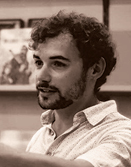 Lorenzo Palloni is a cartoonist, the author of several graphic novels and webcomics, an award-winning writer, and one of the founders of comic artists collective, Mammaiuto. At the moment, he is working on forthcoming books for the French and Italian markets. Lorenzo is also a Scriptwriting and Storytelling teacher at La Scuola Internazionale di Comics di Reggio Emilia (International Comics School of Reggio Emilia).
Lorenzo Palloni is a cartoonist, the author of several graphic novels and webcomics, an award-winning writer, and one of the founders of comic artists collective, Mammaiuto. At the moment, he is working on forthcoming books for the French and Italian markets. Lorenzo is also a Scriptwriting and Storytelling teacher at La Scuola Internazionale di Comics di Reggio Emilia (International Comics School of Reggio Emilia).Louisa Well
Author of the research chapter on Germany
 Louisa Well is a policy advisor to Dr. Anna Christmann, MdB, who is Spokeswoman for Innovation and Technology Policy of the parliamentary group Alliance 90/The Greens at the German Bundestag. In this position, Louisa works on policies in AI and digitization. She received a master’s
degree in science on the subject of science and technology in society from the University of Edinburgh and a Bachelor of Arts in political science and English literature from the University of Heidelberg. For her master’s thesis — on the question of whether automation fosters discrimination in the automated distribution of unemployment benefits in Germany — she did a research placement with Algorithm- Watch.
Louisa Well is a policy advisor to Dr. Anna Christmann, MdB, who is Spokeswoman for Innovation and Technology Policy of the parliamentary group Alliance 90/The Greens at the German Bundestag. In this position, Louisa works on policies in AI and digitization. She received a master’s
degree in science on the subject of science and technology in society from the University of Edinburgh and a Bachelor of Arts in political science and English literature from the University of Heidelberg. For her master’s thesis — on the question of whether automation fosters discrimination in the automated distribution of unemployment benefits in Germany — she did a research placement with Algorithm- Watch.Marc Thümmler
Publication coordinator
 Marc Thümmler is in charge of public relations and outreach at AlgorithmWatch. He has a master’s degree in media studies, has worked as a producer and editor in a film company, and managed projects for the Deutsche Kinemathek and the civil society organization Gesicht Zeigen. In addition to his core tasks at AlgorithmWatch, Marc has been involved in the crowdfunding and crowdsourcing campaign OpenSCHUFA, and he coordinated the first issue of the Automating Society report, published in 2019.
Marc Thümmler is in charge of public relations and outreach at AlgorithmWatch. He has a master’s degree in media studies, has worked as a producer and editor in a film company, and managed projects for the Deutsche Kinemathek and the civil society organization Gesicht Zeigen. In addition to his core tasks at AlgorithmWatch, Marc has been involved in the crowdfunding and crowdsourcing campaign OpenSCHUFA, and he coordinated the first issue of the Automating Society report, published in 2019.Maris Männiste
Author of the research chapter on Estonia
 Maris Männiste is a media and communications Ph.D. student and works as an information systems assistant at the Institute of Social Studies at the University of Tartu. Her research interests include the social consequences of big data and algorithms, perceptions of privacy, and datafication practices. Her recent research explores algorithmic governance ideals, where Estonian experts are considered to be a pioneer community engaged in the analysis and management of data and actively proposing novel data solutions.
Maris Männiste is a media and communications Ph.D. student and works as an information systems assistant at the Institute of Social Studies at the University of Tartu. Her research interests include the social consequences of big data and algorithms, perceptions of privacy, and datafication practices. Her recent research explores algorithmic governance ideals, where Estonian experts are considered to be a pioneer community engaged in the analysis and management of data and actively proposing novel data solutions.Matthias Spielkamp
Editor
 Matthias Spielkamp is co-founder and executive director of AlgorithmWatch (Theodor Heuss Medal 2018, Grimme Online Nominee 2019). He testified before committees of the Council of Europe, the European Parliament, the German Bundestag and other institutions on AI and automation. Matthias serves on the governing board of the German section of Reporters Without Borders and the advisory councils of Stiftung Warentest and the Whistleblower Network. He was a fellow of ZEIT Stiftung, Stiftung Mercator and the American Council on Germany. Matthias received several awards (Grimme Online Award, Lead Award, Klicksafe Award, .info Award) for the magazine iRights.info he co-founded and led as managing editor and publisher for more than ten years. He has written and edited books on the automation of society, digital journalism and Internet governance and holds master’s degrees in Journalism from the University of Colorado in Boulder and in Philosophy from the Free University of Berlin.
Matthias Spielkamp is co-founder and executive director of AlgorithmWatch (Theodor Heuss Medal 2018, Grimme Online Nominee 2019). He testified before committees of the Council of Europe, the European Parliament, the German Bundestag and other institutions on AI and automation. Matthias serves on the governing board of the German section of Reporters Without Borders and the advisory councils of Stiftung Warentest and the Whistleblower Network. He was a fellow of ZEIT Stiftung, Stiftung Mercator and the American Council on Germany. Matthias received several awards (Grimme Online Award, Lead Award, Klicksafe Award, .info Award) for the magazine iRights.info he co-founded and led as managing editor and publisher for more than ten years. He has written and edited books on the automation of society, digital journalism and Internet governance and holds master’s degrees in Journalism from the University of Colorado in Boulder and in Philosophy from the Free University of Berlin.Michele Catanzaro
Author of the journalistic story on Spain
 Michele Catanzaro is a freelance journalist based in Barcelona, Spain. He has a PhD in physics, has written for Nature, El Periódico de Catalunya, Süddeutsche Zeitung, and other outlets, and he is the co-author of the book “Networks: A Very Short Introduction” (2012) and the documentary “Fast Track Injustice: The Óscar Sánchez Case” (2014), that received the Golden Nymph Award in 2015. His work has also been recognized by other awards: King of Spain International Journalism Prize, BBVA Innovadata, Valors, European Science Writer of the Year 2016, Prismas, and Colombine. He has received grants from the Journalism Fund, Journalism Grants, and Climate Investigation Grants. He has experience in teaching, exhibitions, TV, and events, and he coordinates the PerCientEx project on excellence in science journalism in Spain and Latin America. He was also a Journalist in Residence at the Heidelberg Institute for Theoretical Studies.
Michele Catanzaro is a freelance journalist based in Barcelona, Spain. He has a PhD in physics, has written for Nature, El Periódico de Catalunya, Süddeutsche Zeitung, and other outlets, and he is the co-author of the book “Networks: A Very Short Introduction” (2012) and the documentary “Fast Track Injustice: The Óscar Sánchez Case” (2014), that received the Golden Nymph Award in 2015. His work has also been recognized by other awards: King of Spain International Journalism Prize, BBVA Innovadata, Valors, European Science Writer of the Year 2016, Prismas, and Colombine. He has received grants from the Journalism Fund, Journalism Grants, and Climate Investigation Grants. He has experience in teaching, exhibitions, TV, and events, and he coordinates the PerCientEx project on excellence in science journalism in Spain and Latin America. He was also a Journalist in Residence at the Heidelberg Institute for Theoretical Studies.Minna Ruckenstein
Author of the research chapter on Finland
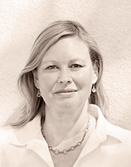 Minna Ruckenstein is an associate professor at the Consumer Society Research Centre and the Helsinki Centre for Digital Humanities at the University of Helsinki. She directs a research group that explores economic, social, emotional, and imaginary aspects of algorithmic systems and processes of datafication. Recently projects have focused on algorithmic culture and rehumanizing automated decision-making. The disciplines of anthropology, science and technology, economic sociology, and consumer research underpin her work. Minna has been published widely in respected international journals, including Big Data & Society, New Media & Society, and Social Science & Medicine. Prior to her academic work, she was a journalist and an independent consultant, and this professional experience has shaped the way she works, in a participatory manner with stakeholders involved. Her most recent collaborative projects have explored practices of content moderation and data activism.
Minna Ruckenstein is an associate professor at the Consumer Society Research Centre and the Helsinki Centre for Digital Humanities at the University of Helsinki. She directs a research group that explores economic, social, emotional, and imaginary aspects of algorithmic systems and processes of datafication. Recently projects have focused on algorithmic culture and rehumanizing automated decision-making. The disciplines of anthropology, science and technology, economic sociology, and consumer research underpin her work. Minna has been published widely in respected international journals, including Big Data & Society, New Media & Society, and Social Science & Medicine. Prior to her academic work, she was a journalist and an independent consultant, and this professional experience has shaped the way she works, in a participatory manner with stakeholders involved. Her most recent collaborative projects have explored practices of content moderation and data activism.Nadja Braun Binder
Author of the research chapter on Switzerland
 Nadja Braun Binder studied law at the University of Berne and received her doctorate there. Her academic career took her to the Research Institute of Public Administration in Speyer in 2011, where she conducted research on the automation of administrative procedures, among other things. In 2017, she was habilitated by the German University of Administrative Sciences, Speyer, and followed
a call to the Faculty of Law at the University of Zurich, where she worked as an assistant professor until 2019. Since 2019 Nadja has been Professor of Public Law at the University of Basel. Her research focuses on legal issues related to digitization in government and administration. She is currently conducting a study on the use of artificial intelligence in public administration in the canton of Zurich.
Nadja Braun Binder studied law at the University of Berne and received her doctorate there. Her academic career took her to the Research Institute of Public Administration in Speyer in 2011, where she conducted research on the automation of administrative procedures, among other things. In 2017, she was habilitated by the German University of Administrative Sciences, Speyer, and followed
a call to the Faculty of Law at the University of Zurich, where she worked as an assistant professor until 2019. Since 2019 Nadja has been Professor of Public Law at the University of Basel. Her research focuses on legal issues related to digitization in government and administration. She is currently conducting a study on the use of artificial intelligence in public administration in the canton of Zurich.Naomi Appelman
Author of the research chapter on the Netherlands
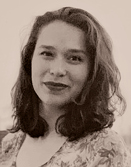 Naomi Appelman is a PhD researcher at the Institute for Information Law (IViR), University of Amsterdam. Her PhD looks
at platform regulation and automated decision-making through the lens of democratic values and fundamental rights within the broader context of the digital transition of decision-making research initiatives. She combines legal and philosophical perspectives in her research, which focuses on strengthening the position of people in online speech regulation. Within the IViR, she has worked on research reports on disinformation and political advertisements
for the Dutch Ministry of Internal Affairs, and she has worked on an online content moderation report. Naomi also studied philosophy at the University of Amsterdam.
Naomi Appelman is a PhD researcher at the Institute for Information Law (IViR), University of Amsterdam. Her PhD looks
at platform regulation and automated decision-making through the lens of democratic values and fundamental rights within the broader context of the digital transition of decision-making research initiatives. She combines legal and philosophical perspectives in her research, which focuses on strengthening the position of people in online speech regulation. Within the IViR, she has worked on research reports on disinformation and political advertisements
for the Dutch Ministry of Internal Affairs, and she has worked on an online content moderation report. Naomi also studied philosophy at the University of Amsterdam.Natalia Mileszyk
Author of the research chapter on Poland
 Natalia Mileszyk is a lawyer, public policy expert, and head of digital and technology practice at CEC Government Relations, based in Warsaw. Previously, she was a public policy expert at Centrum Cyfrowe Foundation, a leading Polish think-and-do-tank, dealing with the social aspects of technology and the need for human-centered digital policy. Recently, this involved such issues as online platform regulations, AI, automated decision-making, and sharing economy regulations. She graduated from Warsaw University and Central European University in Budapest (LL.M.).
Natalia Mileszyk is a lawyer, public policy expert, and head of digital and technology practice at CEC Government Relations, based in Warsaw. Previously, she was a public policy expert at Centrum Cyfrowe Foundation, a leading Polish think-and-do-tank, dealing with the social aspects of technology and the need for human-centered digital policy. Recently, this involved such issues as online platform regulations, AI, automated decision-making, and sharing economy regulations. She graduated from Warsaw University and Central European University in Budapest (LL.M.).Nicolas Kayser-Bril
Editor, author of the journalistic Story of France, Denmark, Switzerland, Germany and the research chapter on France.
 Nicolas Kayser-Bril is a data journalist, and he works for AlgorithmWatch as a reporter. He pioneered new forms of journalism in France and Europe and is one of the leading experts on data journalism. He regularly speaks at international conferences, teaches journalism in French journalism schools, and gives training sessions in newsrooms. A self-taught journalist and developer (and a graduate in Economics), he started by developing small interactive, data-driven applications for Le Monde in Paris in 2009. He then built the data journalism team at OWNI in 2010 before co-founding and managed Journalism++ from 2011 to 2017. Nicolas is also one of the main contributors to the Data Journalism Handbook, the reference book for the popularization of data journalism worldwide.
Nicolas Kayser-Bril is a data journalist, and he works for AlgorithmWatch as a reporter. He pioneered new forms of journalism in France and Europe and is one of the leading experts on data journalism. He regularly speaks at international conferences, teaches journalism in French journalism schools, and gives training sessions in newsrooms. A self-taught journalist and developer (and a graduate in Economics), he started by developing small interactive, data-driven applications for Le Monde in Paris in 2009. He then built the data journalism team at OWNI in 2010 before co-founding and managed Journalism++ from 2011 to 2017. Nicolas is also one of the main contributors to the Data Journalism Handbook, the reference book for the popularization of data journalism worldwide.Nikolas Leontopoulos
Author of the jornalistic story chapter on Greece
 Nikolas Leontopoulos is a Greek journalist based in Athens. He is the co-founder of Reporters United, a new center for investigative journalism that incorporates a network of reporters in Greece. For ten years, Nikolas worked for the Athens daily, Eleftherotypia. He collaborated with Reuters on investigations into Greek banking, shipping, and media, and he reported for the “Outlaw Ocean” New York Times series. During the Greek financial crisis, he worked as a fixer for several international media outlets, field-produced documentaries for VRPO, ARTE, and Al Jazeera, and he researched for ARD’s documentary “The Trail of the Troika”. He made two documentaries for VICE Greece: “The European Commission and the Defense Industry Lobby” and “The German Big Brother”. He was a co-founder of Investigate Europe, a consortium of European journalists publish- ing with media partners across Europe.
Nikolas Leontopoulos is a Greek journalist based in Athens. He is the co-founder of Reporters United, a new center for investigative journalism that incorporates a network of reporters in Greece. For ten years, Nikolas worked for the Athens daily, Eleftherotypia. He collaborated with Reuters on investigations into Greek banking, shipping, and media, and he reported for the “Outlaw Ocean” New York Times series. During the Greek financial crisis, he worked as a fixer for several international media outlets, field-produced documentaries for VRPO, ARTE, and Al Jazeera, and he researched for ARD’s documentary “The Trail of the Troika”. He made two documentaries for VICE Greece: “The European Commission and the Defense Industry Lobby” and “The German Big Brother”. He was a co-founder of Investigate Europe, a consortium of European journalists publish- ing with media partners across Europe.Paula Simões
Author of the jornalistic story chapter on Portugal
 Paula Simões has a degree in journalism and is currently doing her Ph.D. in digital humanities. She is an active member of ANSOL, the Portuguese National Association for Free Software, and she is also an active member of D3, the Portuguese Digital Rights Association. She was also president of AEL, an association that promoted F/LOSS, Creative Commons, Public Domain, and Open Access in education and scientific research, and she has been writing about these themes for more than a decade.
Paula Simões has a degree in journalism and is currently doing her Ph.D. in digital humanities. She is an active member of ANSOL, the Portuguese National Association for Free Software, and she is also an active member of D3, the Portuguese Digital Rights Association. She was also president of AEL, an association that promoted F/LOSS, Creative Commons, Public Domain, and Open Access in education and scientific research, and she has been writing about these themes for more than a decade.Ronan Ó Fathaigh
Author of the research chapter on the Netherlands
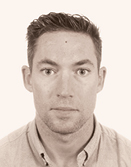 Ronan Ó Fathaigh is a Senior Researcher at the Institute for Information Law (IViR), University of Amsterdam. He is a member of the Digital Transformation of Decision-Making research initiative, examining the normative implications of the shift toward automated decision-making and the effect on democratic values and fundamental rights. Ro- nan has published his work in a number of international academic journals and co-authored reports for international institutions such as the Council of Europe and the European Parliament. He has also co-authored a report for the Dutch Ministry of Internal Affairs on online disinformation and political advertisements, and he has conducted research on automated decision-making in content moderation systems, as part of a joint research initiative of IViR and the Annenberg Public Policy Center, University of Pennsylvania. Ronan has a Ph.D. in law from Ghent University, and he is a former visiting research fellow at Columbia University. Ronan is a regulator contributor to the Strasbourg Observers blog, commenting on current human rights issues.
Ronan Ó Fathaigh is a Senior Researcher at the Institute for Information Law (IViR), University of Amsterdam. He is a member of the Digital Transformation of Decision-Making research initiative, examining the normative implications of the shift toward automated decision-making and the effect on democratic values and fundamental rights. Ro- nan has published his work in a number of international academic journals and co-authored reports for international institutions such as the Council of Europe and the European Parliament. He has also co-authored a report for the Dutch Ministry of Internal Affairs on online disinformation and political advertisements, and he has conducted research on automated decision-making in content moderation systems, as part of a joint research initiative of IViR and the Annenberg Public Policy Center, University of Pennsylvania. Ronan has a Ph.D. in law from Ghent University, and he is a former visiting research fellow at Columbia University. Ronan is a regulator contributor to the Strasbourg Observers blog, commenting on current human rights issues.Rosamunde van Brakel
Author of the research chapter on Belgium
 Rosamunde van Brakel works as a parttime research professor at the LSTS research group of the Vrije Universiteit Brussel (VUB) in Belgium, where she coordinates the Chair in Surveillance Studies and conducts research on democratic governance of surveillance and crime control. In addition, she works as a part-time postdoctoral researcher at the imec-SMIT-VUB research group working on the SPECTRE project on smart cities and DPIAs. Also,
she is co-director of the Computers, Privacy and Data Protection annual international conference, co-founder and executive director of the non-profit organization Privacy Salon, and co-director of the Surveillance Studies Network. She studied educational sciences and criminology at the Katholieke Universiteit Leuven and the University of Ottawa. Previously, she conducted research on electronic monitoring of offenders, freedom infringements of transport security technologies, evaluation and certification schemes for security products and Big Data, privacy, and security.
Rosamunde van Brakel works as a parttime research professor at the LSTS research group of the Vrije Universiteit Brussel (VUB) in Belgium, where she coordinates the Chair in Surveillance Studies and conducts research on democratic governance of surveillance and crime control. In addition, she works as a part-time postdoctoral researcher at the imec-SMIT-VUB research group working on the SPECTRE project on smart cities and DPIAs. Also,
she is co-director of the Computers, Privacy and Data Protection annual international conference, co-founder and executive director of the non-profit organization Privacy Salon, and co-director of the Surveillance Studies Network. She studied educational sciences and criminology at the Katholieke Universiteit Leuven and the University of Ottawa. Previously, she conducted research on electronic monitoring of offenders, freedom infringements of transport security technologies, evaluation and certification schemes for security products and Big Data, privacy, and security.Samuel Daveti
Comic artist
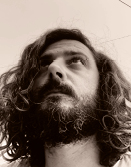 Samuel Daveti is a founding member of the Cultural Association, Double Shot. He is the author of the French language graphic-novel, Akron Le guerrier (Soleil, 2009), and he is the curator of the anthological volume Fascia Protetta (Double Shot, 2009). In 2011, he became a founding member of the self-produced comics collective, Mammaiuto. Samuel also wrote Un Lungo Cammino (Mammaiuto, 2014; Shockdom, 2017), which will become a film for the media company Brandon Box. In 2018, he wrote The Three Dogs, with drawings by Laura Camellia, which won the Micheluzzi Prize at Napoli Comicon 2018 and the Boscara- to award for the best webcomic at the Treviso Comic Book Festival.
Samuel Daveti is a founding member of the Cultural Association, Double Shot. He is the author of the French language graphic-novel, Akron Le guerrier (Soleil, 2009), and he is the curator of the anthological volume Fascia Protetta (Double Shot, 2009). In 2011, he became a founding member of the self-produced comics collective, Mammaiuto. Samuel also wrote Un Lungo Cammino (Mammaiuto, 2014; Shockdom, 2017), which will become a film for the media company Brandon Box. In 2018, he wrote The Three Dogs, with drawings by Laura Camellia, which won the Micheluzzi Prize at Napoli Comicon 2018 and the Boscara- to award for the best webcomic at the Treviso Comic Book Festival.Sarah Fischer
Editor
 Sarah Fischer is a project manager for the “Ethics of Algorithms” project at the Bertelsmann Stiftung, in which she is primarily responsible for the scientific studies. She has previously worked as a postdoctoral fellow in the graduate program “Trust and Communication in a Digitalized World” at the University of Münster where she focused on the topic of trust in search engines. In the same research training group, she earned her doctorate with a thesis on trust in health services on the Internet. She studied communication science at the Friedrich Schiller University in Jena, and she is the co-author of the papers “Where Machines can err. Sources of error and responsibilities in processes of algorithmic decision making” and “What Germany knows and believes about algorithms”.
Sarah Fischer is a project manager for the “Ethics of Algorithms” project at the Bertelsmann Stiftung, in which she is primarily responsible for the scientific studies. She has previously worked as a postdoctoral fellow in the graduate program “Trust and Communication in a Digitalized World” at the University of Münster where she focused on the topic of trust in search engines. In the same research training group, she earned her doctorate with a thesis on trust in health services on the Internet. She studied communication science at the Friedrich Schiller University in Jena, and she is the co-author of the papers “Where Machines can err. Sources of error and responsibilities in processes of algorithmic decision making” and “What Germany knows and believes about algorithms”.Tom Wills
Author of the research chapter on United Kingdom
 Tom Wills is a freelance data journalist and researcher based in Berlin. His specialty is using computational techniques for journalistic research and analysis — a type of data journalism. Previously, he led the data journalism team at The Times of London, using computational techniques to drive investigations on topics ranging from Westminster politics to the gender pay gap. Using tools such as the Python coding language to design algorithms for the purposes of public interest journalism has given him an insight into the perils of automation. He has also reported on the consequences of data-driven decision-making, including a major investigation into the World-Check bank screening database which resulted in stories published in six countries as part of an international collaboration. Tom graduated from City University, London with a master’s degree in investigative journalism in 2012.
Tom Wills is a freelance data journalist and researcher based in Berlin. His specialty is using computational techniques for journalistic research and analysis — a type of data journalism. Previously, he led the data journalism team at The Times of London, using computational techniques to drive investigations on topics ranging from Westminster politics to the gender pay gap. Using tools such as the Python coding language to design algorithms for the purposes of public interest journalism has given him an insight into the perils of automation. He has also reported on the consequences of data-driven decision-making, including a major investigation into the World-Check bank screening database which resulted in stories published in six countries as part of an international collaboration. Tom graduated from City University, London with a master’s degree in investigative journalism in 2012.Tuukka Lehtiniemi
Author of the research chapter on Finland
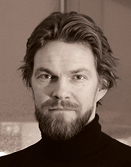 Tuukka Lehtiniemi is an economic sociologist and a postdoctoral researcher at the Centre for Consumer Society Research at the University of Helsinki. He is broadly interested in how the uses we invent for new technologies are shaped by how we imagine the economy to work.
His current research focuses on the data economy and automated decision-making technologies. He previously worked at Aalto University, and, prior to that, in expert positions in the Finnish public sector. In 2018, he was a fellow at the Alexander von Humboldt Institute for Internet and Society in Berlin. His work has been published in New Media & Society, Big Data & Society, and Surveillance & Society.
Tuukka Lehtiniemi is an economic sociologist and a postdoctoral researcher at the Centre for Consumer Society Research at the University of Helsinki. He is broadly interested in how the uses we invent for new technologies are shaped by how we imagine the economy to work.
His current research focuses on the data economy and automated decision-making technologies. He previously worked at Aalto University, and, prior to that, in expert positions in the Finnish public sector. In 2018, he was a fellow at the Alexander von Humboldt Institute for Internet and Society in Berlin. His work has been published in New Media & Society, Big Data & Society, and Surveillance & Society.